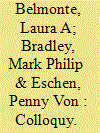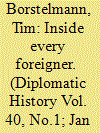|
|
|
Sort Order |
|
|
|
Items / Page
|
|
|
|
|
|
|
| Srl | Item |
| 1 |
ID:
145211


|
|
|
|
|
| Summary/Abstract |
With its projection of the United States as a superpower, World War II was a watershed in diplomatic history. At the same time, historians acknowledge that memories of prewar phenomena–isolationism, Wilsonianism, anti-imperialism, Munich, etc.–helped to shape the postwar thoughts and actions of foreign policy makers. It would seem perverse to assert that post-1945 policy owed little or nothing to what passed before the United States entered the war.
|
|
|
|
|
|
|
|
|
|
|
|
|
|
|
|
| 2 |
ID:
145208


|
|
|
|
|
| Summary/Abstract |
Queer isn’t a word you see much in the pages of Diplomatic History or the program for SHAFR’s annual conference. Indeed, a quick lexical check of article titles since the journal began publication in 1977 for “gay,” “homosexual,” “lesbian,” “transgender,” and “queer” brings up absolutely nothing (bracketing the single title reference to the Enola Gay). You may not be surprised. You should be. Queer history and queer studies occupy an increasingly central place in many historical subfields and in the work of other disciplines. Even for the redoubtable guardians of realism among political scientists in international relations, one can detect a queer turn.1 The time has more than come to better understand how queering the history of American foreign relations might transform our own scholarly practice, and the field itself.
|
|
|
|
|
|
|
|
|
|
|
|
|
|
|
|
| 3 |
ID:
145207


|
|
|
|
|
| Summary/Abstract |
Thomas (“Tim”) Borstelmann is the Elwood N. and Katherine Thompson Distinguished Professor of Modern World History at the University of Nebraska-Lincoln. Previously, he taught for twelve years at Cornell University. He holds a B.A. (1980) from Stanford University and an M.A. (1986) and Ph.D. (1990) from Duke University. His first book, Apartheid’s Reluctant Uncle: The United States and Southern Africa in the Early Cold War (1993) was awarded SHAFR’s Stuart L. Bernath Book Prize. Borstelmann has also published The Cold War and the Color Line: American Race Relations in the Global Arena (2001) and The 1970s: A New Global History from Civil Rights to Economic Inequality (2012), and is a coauthor of Created Equal: A History of the United States (Pearson, 4th ed., 2013).
|
|
|
|
|
|
|
|
|
|
|
|
|
|
|
|
| 4 |
ID:
145209


|
|
|
|
|
| Summary/Abstract |
“Interior’s Exterior” investigates an unexamined material lineage of the Point Four program, the foreign policy initiated by President Truman in 1949 to offer technical assistance to the developing world. Unlikely foreign diplomats hailing from the Department of the Interior spearheaded efforts within participating Point Four countries to target and unearth foreign minerals. Decision makers rationalized the hidden mineral agenda within development by citing two resource-based ideologies, “resource globalism” and “resource primitivism,” which posited that minerals by nature evaded national sovereignty and primitive people’s understanding. To enact this plan, Interior technicians utilized procedures, from geological reconnaissance to juridical reform, to develop new commodity markets and ease foreign investments. Such procedures were historically and simultaneously used in the domestic context in order to dispossess Native Americans of their minerals. Building upon the history of U.S. settler colonialism, Interior field agents materially re-ordered foreign landscapes in preparation for the globalization of American capitalism.
|
|
|
|
|
|
|
|
|
|
|
|
|
|
|
|
| 5 |
ID:
145210


|
|
|
|
|
| Summary/Abstract |
This article examines the conservative radio program the Manion Forum of Opinion as an important site of transnational cooperation between American conservative activists and businessmen, their allies in Latin America, Southeast Asia, and Africa. I argue that the modern American right took shape in dialogue with other kindred movements abroad.
|
|
|
|
|
|
|
|
|
|
|
|
|
|
|
|
| 6 |
ID:
145212


|
|
|
|
|
| Summary/Abstract |
This article examines how United States officials observed the Slovak Question during the Czechoslovak Republic’s foundation from 1918 to 1921, to determine what the Slovak case exposes about the Wilsonian administration’s view and application of national self-determination after World War I. This article shows how conceptions of modernity were central to Wilsonian national self-determination, as the Wilson administration placed divergent views on the Czechs and Slovaks based on images of civic, economic, and cultural development, despite qualifying the two peoples as a common nationality. In doing so, the Wilson administration prioritized Czech views of a centralized state administered from Prague, over the appeals of many Slovaks who desired domestic autonomy for Slovakia within the state. This Wilsonian prioritization of civic development and modernity over national identity thus abetted a volatile national-political environment in the reorganized East Central Europe by dismissing the views of many national minorities in the region, such as the Slovaks, in their desires for national self-determination.
|
|
|
|
|
|
|
|
|
|
|
|
|
|
|
|
|
|
|
|
|